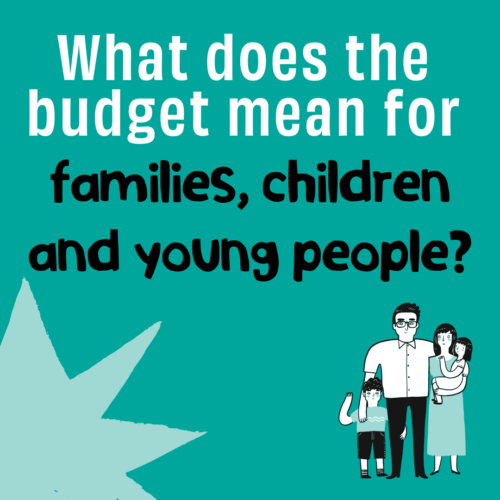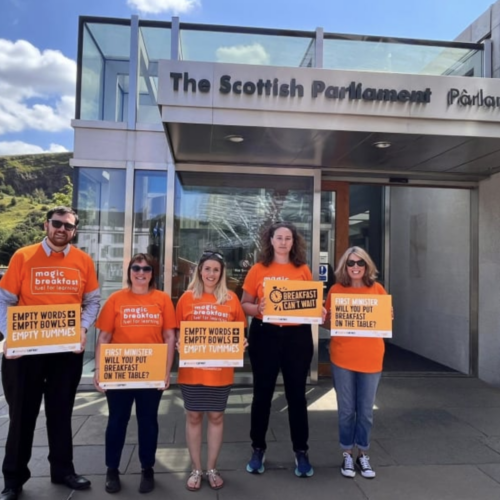This budget has been hailed as being history making. Not only is it the first budget from the first woman Chancellor ever, in 800 years of history, but it has delivered the largest tax hike in a generation with a huge £40 billion tax increase and an extra £70bn spending commitment. Will it result in the economic growth that the country is desperate for, and the Labour government have promised? The experts have mixed opinions on that and in reality that is still a story to be told.
Immediately after the budget, our CEO, Lindsey MacDonald, provided an overview of the commitment to breakfast provision – both the knowns and significantly the questions still to be answered and important asks of Government. In this article, I want to focus on the key points from the budget that will impact the communities, families, children and young people that Magic Breakfast serves. For our ambition for those families goes beyond providing breakfast, to enabling every new generation to have the best potential life chances. We know that addressing the root causes of hunger in the morning is just as essential in order to shift those long-term outcomes.
The budget laid out significant investment in public services, with education receiving an additional £2.3 billion in 2025/26, including £1 billion for SEND. Whilst this has been broadly welcomed by the sector, including the Fair Education Alliance and the National Education Union, it is viewed as only just starting to plug the historic under funding in education, and is likely to be eroded by inflation and other announcements from the budget (more on that to come).
We were also pleased to see the confirmation that the Soft Drinks Industry Levy will be uprated in line with inflation (and further indexed to inflation in the future) for the first time. This has been a real success story and had originally provided funding for school breakfast as part of the NSBP. As part of the Recipe for Change campaign we want the Government to build on the success of the Soft Drinks Industry Levy, by extending similar regulation to a wider range of food and drink high in salt and sugar. The campaign has built a tool to enable you to choose from a menu of policy options and build your own vision for children’s health, which includes universal free breakfast for secondary schools. In our “What’s for Breakfast” research, we found that secondary school students who are not eating a healthy breakfast are more likely to eat unhealthy snack options during the day. This is the age where healthy eating habits are formed, and unhealthy eating relationships take root. The forthcoming Comprehensive Spending Review in Spring 2025 is an ideal opportunity to consider new models for building incentives into the whole food industry.
More money in people’s pockets for those on lower incomes has been seen through the above inflation increase in the National Living Wage, rising by between 6.7% and 18% depending on the age category, from 1 April 2025. The biggest percentage rise for the 16-17 and 18-20 year olds is intended to eventually equalise the level to that for 21+ year olds.
Universal Credit will also rise with inflation by 1.7% from 1 April 2025, although as pointed out by the Resolution Foundation, this has been pegged to a bigger than expected fall in inflation in September and is widely expected to rise again by the end of the year. This means that for those families relying on benefits, the rise will be less than the rise in the cost of living by the time it comes into force.
It was also announced that the amount of debt repayments that can be taken from a household’s Universal Credit payment each month will be reduced from 25% to 15%, a move that has been welcomed by Save the Children who have calculated that around 700,000 of the poorest families with children will benefit as a result of this policy change at the Budget.
However, disappointingly the two-child limit has not been removed. End Child Poverty, a coalition of whom Magic Breakfast are members, has campaigned fiercely to end these unfair measures, and the Children’s Charities Coalition reacted with deep disappointment to the failure to remove the limit “which would lift an estimated 300,000 children out of poverty immediately.” Magic Breakfast has also heard from schools and seen through our various research reports that larger families are more likely to struggle and need support at breakfast. Lifting this limit must be a commitment made as part of the upcoming Child Poverty Strategy.
And there is more mixed news on National Insurance. In line with Labour’s manifesto commitment, the chancellor has chosen not to raise employee contributions to National Insurance, and instead the main burden of tax increases in the budget now weighs on employers. It was announced that employer National Insurance contributions will rise by 1.2% from 13.8% to 15%, and the threshold at which they will start paying NI contributions will reduce from £9,100 to £5,000. Whilst this limits the immediate financial cost to families, leaving more money in pockets in the near time, there are concerns that longer term it will lead to price increases, limit hiring and wage growth, as employers seek to make their books balance.
This National Insurance rise will also impact charities, and, like Magic Breakfast, many will now be evaluating what this rise will mean for their finances. We have signed this letter organised by NCVO and ACEVO to outline the concerns around the struggle to balance soaring demand for services, whilst costs escalate and funding declines. The letter urges to the chancellor to commit to reimbursing voluntary organisations’ increased employer NICs, as will be done for the public sector.
One of the issues that schools tell us has the biggest impact on their families is housing. Whilst there has been a commitment to building more new houses, there is no clear plan to achieve that. Most disappointingly the Local Housing Allowance hasn’t gone up, whilst rents have gone up 8.4% on average year on year.
Similarly, student maintenance loans have not kept up with inflation and are not increasing, which is going to mean that university becomes ever more unaffordable for those on a lower income. So young people’s education is cut short, and their life chances and social mobility ability impacted, along with economic growth.
On the other end of the education scale, there was very little on Early Years in the budget, an area that Bridget Phillipson has previously said to be her “number one priority”. Magic Breakfast feeds thousands of early years children in nurseries that are part of member primary schools. As part of the Early Education and Childcare Coalition, we hope that the Spring Spending Review will reveal more of Labour’s ambition for early years including how it will reform the system so it delivers for every child.
Whilst there is no increase in fuel duty, for the 13th year in a row, a 50% increase on bus fares cap from £2 to £3 in most of the UK is concerning. This can be a vital mode of transport for families to school and is going to impact low income families. London and Manchester have devolved funding which have excluded them from this price increase.
What is clear is that the issues that contribute to child morning hunger are challenging and complex, and this is by no means an exhaustive list. It is going to require a true transformation of the system and this will take time. What we can already see is that there has been a significant shift in the approach by this new Government, and we are yet to see how these budgets will be operationalised by Government departments. For further reading, this is a great summary of key points from Sean Harris. I also found this episode of The Rest is Money podcast really useful for a long term view on how the public spending investment has the potential to deliver for business, through better healthcare, better transport, and better skills.






